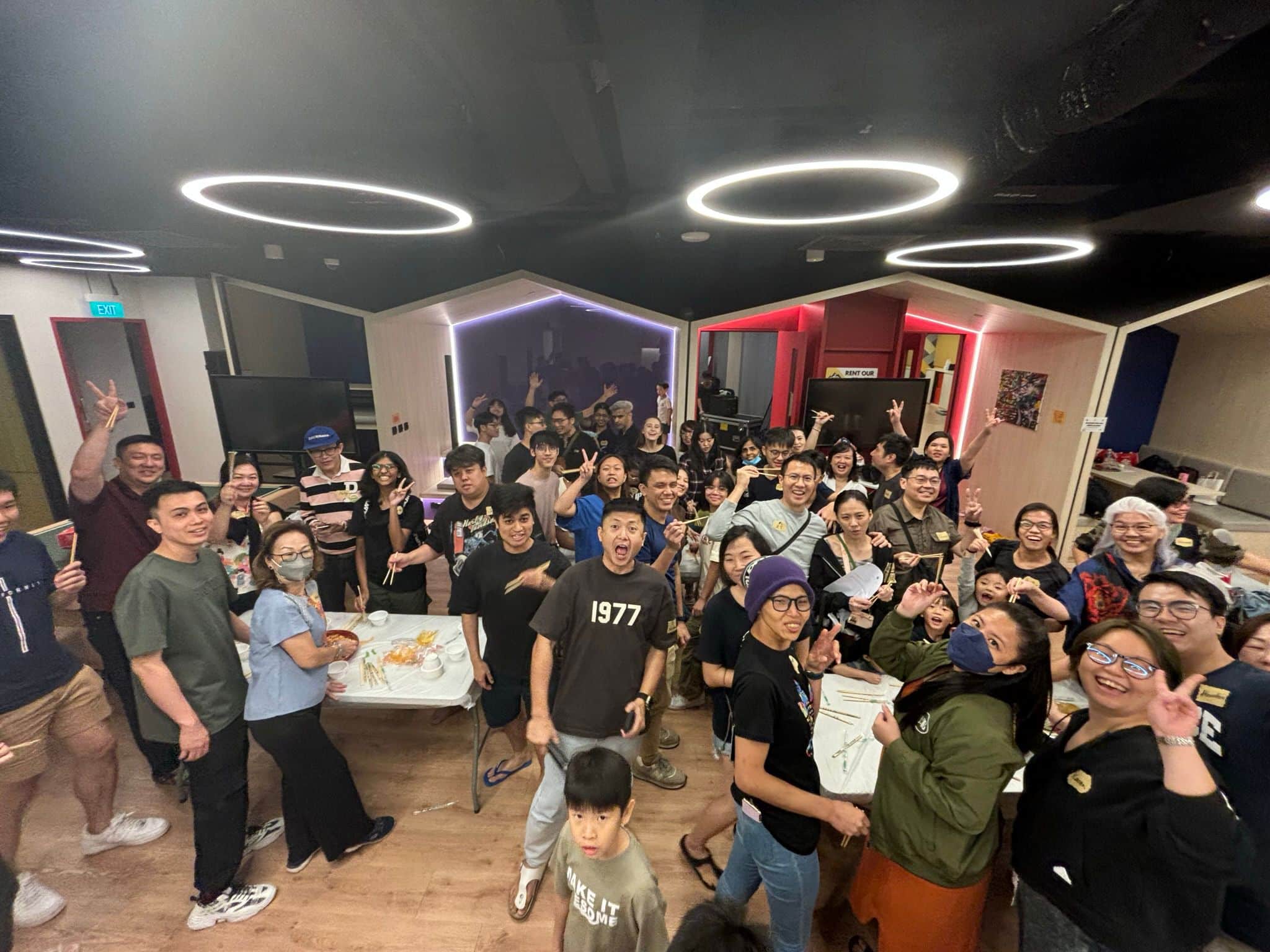How do we operationalise grace? Here’s what these marketplace leaders have learnt from grappling with tough questions
Emilyn Tan // October 11, 2022, 11:21 am
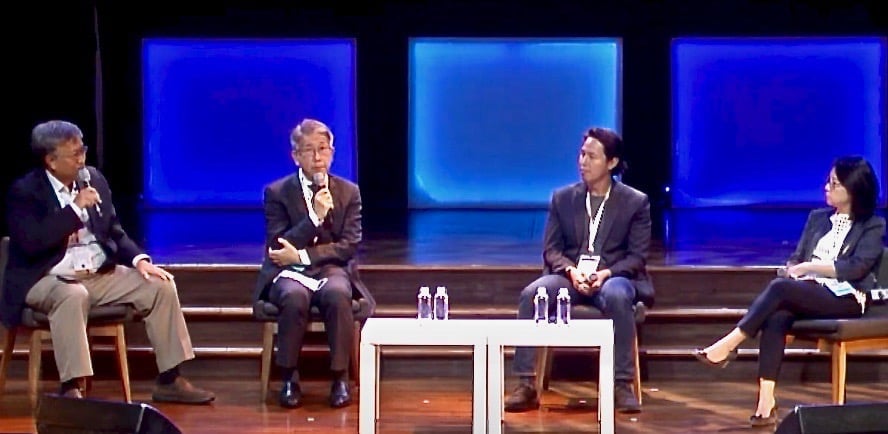
Grit and gumption undergirded by grace? It's in alignment with God's plan, said a Movement Day Asia Cities panel of speakers. All screengrabs from Movement Day Asia Cities' Zoom meeting.
The role of church and marketplace leaders in the Gospel transformation of cities was the overarching theme of Movement Day Asia Cities, which ran last Thursday and Friday (October 6 and 7) in Singapore.

The Movement Day Asia Cities panel of speakers discussed how they strive to run their businesses in such a way that redemptive solutions are brought down from heaven to earth.
Discussing “God’s Movement in Asia’s Marketplace” on the first day, panel speakers Philip Ng, Reuben Lai and Dilys Chau gave their perspective as Christians leaders of Far East Organization, Grab, and Ernst&Young Hong Kong, respectively.
The following is an extract from the discussion, with the panellists sharing their own journeys, as well as how they strive to run their businesses in such a way that redemptive solutions are brought down from heaven to earth.
“We want to do business with grace”
Philip Ng, CEO, Far East Organisation, became a Christian in 2000 after doing the Alpha course.
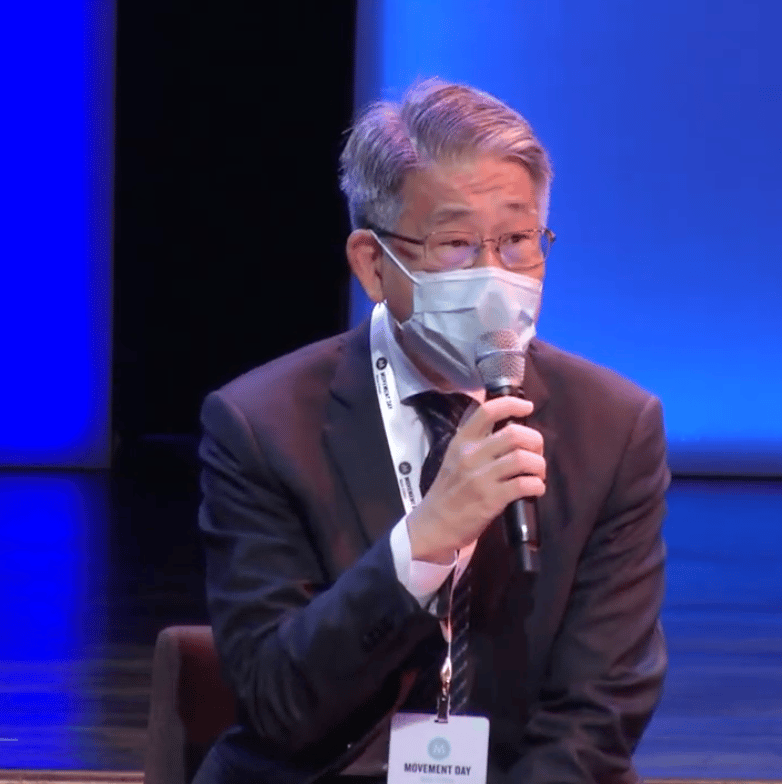
Philip Ng: “We must treat people as people. Everybody has a different situation.”
Being a steward of a family business, I’ve decided that the best way I could actually show my dedication and devotion to the Lord is to make my organisation a Christian enterprise.
“Surprisingly, the challenges that we faced were from Christians and not the non-Christians.”
It’s not easy in Singapore where we are a multi-religious, multi-cultural, multi-racial country.
But stepping out for Christ actually allows me to share the Gospel in my organisation.
Surprisingly, (in the transition) the challenges that we faced were actually from Christians and not the non-Christians, because the Christians are challenged to show love.
The danger is that we can be good Christians but perhaps only on Sundays. The rest of the week we behave with the intellectual capacity to solve problems, but we don’t do it in the Lord’s way.
We operate clearly in a very secular way – it’s always profit maximisation and the benefit of the shareholders. That is, in a way, a Babylonian kind of system.
How do we operationalise grace?
For us to make an impact as businesses, we have to counteract the Babylonian system, and that’s doing business with grace.
Here we have to allow the Holy Spirit to work through us unfettered, if we want to touch lives and transform lives, and point to Jesus Christ and share the blessings that we have in business.
As in the Acts of the Apostles, the Holy Spirit will guide us and lead us. We have to be prayerful and depend on God and God’s provisions.
If we leave it to our own human understanding and intellect and the way we solve things, we will try to operationalise grace as a standard operating procedure, and that would not be grace.
“How do you show love and compassion if everybody is treated as a number?”
In fact, when I first mentioned to my colleagues that we want to act as a Christian enterprise and we want to do business with grace, one of my managers said: “How do we operationalise grace? What are the SOPs?”
The change impacted our human resource management deeply, because how do you show love and compassion if everybody is treated as a number?
Here we said: “No, we must treat people as people. Everybody has a different situation.”
Grace is not something that you administer to a body of people who are nameless and just a number. Grace is always on an individual and personal level.
Today we are confronted with the same challenges: How do we personalise the way we manage each and every person as an individual rather than as data points and sets of statistics?
This is the danger of business, because we are relying more and more on algorithms and data and statistics.
“Business is church”
Reuben Lai is Senior Managing Director of Grab and head of Grab Financial Group. In introducing him, panel moderator Timothy Wong said: “Reuben is from an organisation that has become what it is today because it’s thought about things disruptively. Grab has now become one of the Singapore companies that has been able to branch into many other countries in ASEAN that most Singapore companies would not dare to go.”
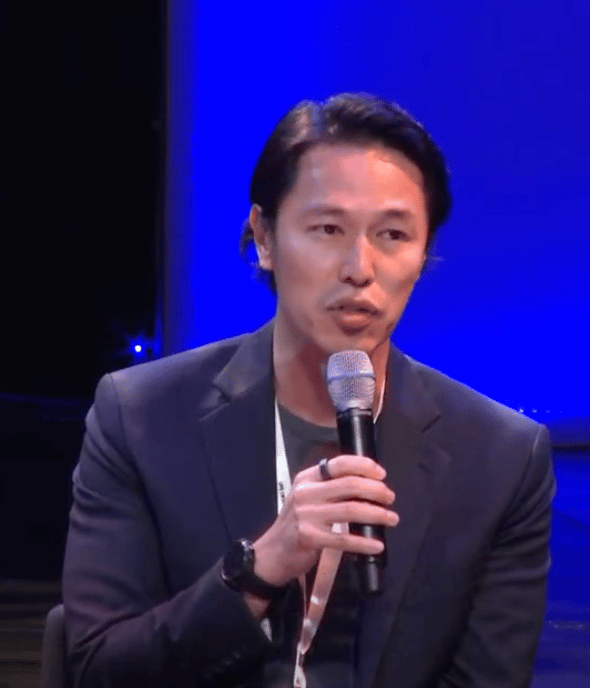
Reuben Lai: “We are actually trying to bring in a better way, a different way and, as believers, a Kingdom way of doing things.”
My journey here is not a single moment but a series of encounters. It started when I first met the late Uncle (Thio) Gim Hock and Aunty Su Mien, who allowed me to journey with them.
I saw how Uncle Gim Hock, as a marketplace leader, was able to live wholeheartedly for God using his ministry at work, as well as outside of work, and win hearts and souls for the Lord.
I was very inspired by that, and subsequently that was what I took with me as I ventured into the business world.
Start-up thinking disrupting old ways
We prefer the word “reimagine”. “Disruptive” implies that we are just trying to create chaos.
But we are actually trying to bring in a better way, a different way and, as believers, a Kingdom way of doing things.
We believe that in the process we are rebuilding His Kingdom here on earth as it is in heaven. And this is just part of the journey – the many versions of it.
“We keep dreaming, we keep building, we keep trusting.”
I joined Grab close to eight years ago. We had about 300 people then; we were a pure taxi-booking app. Right now we have 10,000 people and we provide services like food delivery, financial services and banking.
It’s come a long way, but at the heart of it all is a big desire to serve Southeast Asia.
When I first met Anthony (Tan), the CEO of Grab, he said that he wanted to be a pastor. I said, “Oh! This is different, a different type of interview!”
He said: “Reuben, this is not a taxi-booking platform, this is a platform where we can create jobs for people across the region.”
My imagination started growing wild and I started thinking: What if the next generation of people didn’t have to go overseas (to find work)? They could just stay in their own home countries – Philippines, Indonesia, wherever it is – earn a decent living, be with their kids, be able to take their kids through school and university.
Wow, the impact for the next generation would be huge!
Are we there yet? No, we’re not. But we keep dreaming, we keep building, we keep trusting.
Future readiness is …
For us, it’s really about three things. One: Having the desire to birth Kingdom solutions into this world.
We can plan all these things but it is really the Spirit of the Lord that makes it happen.
Second, having the courage and boldness (Joshua 1:8) to be able to do that.
The third is seeking the favour of the Lord, because we can plan all these things but it is really the Spirit of the Lord that makes it happen. We are just so thankful that when we avail ourselves, we just show up, going with His blessings and His plans, it has taken us so far.
There’s still a lot more to be done. What’s really exciting right now is that many other tech companies have been birthed from alums from our business.
They’ve caught the vision, the excitement, the possibility that it can be done. And using that, they are also birthing new solutions that would just help improve Southeast Asia.
“Transport people from workplace culture to church culture”
Dilys Chau, Partner, Ernst & Young Hong Kong, became a believer in secondary school, but was not serious about her faith until there arose struggles in her working life. That was 20 years ago. She has been “seriously engaged” with God since.
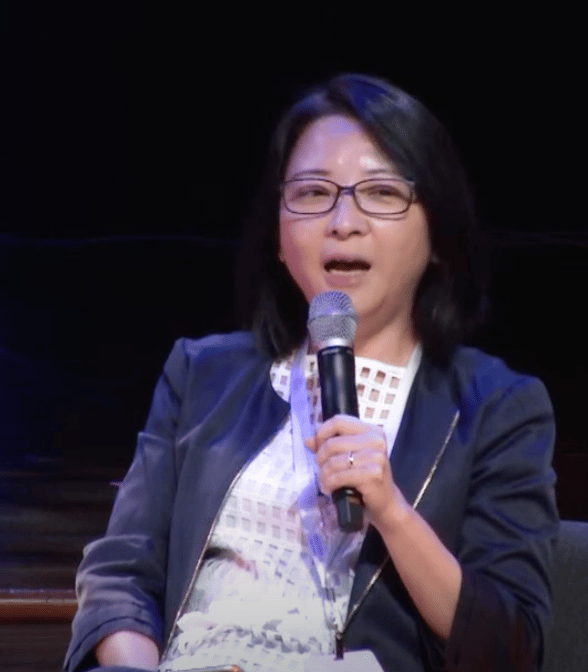
Dilys Chau: “I started to dream: How we can really bring the Gospel, bring church, to the marketplace?”
While at a prayer meeting, I had a very vivid vision. I saw all my colleagues coming like a stream towards me, and they parted before me. That was really mind-blowing.
“I want to win the marketplace for God and just preach, and let believing in Jesus become the trend in my office.”
I started to think that God wants me to do something in the marketplace. I want to win the marketplace for God and just preach, and let believing in Jesus become the trend in my office.
I started to dream: How we can really bring the Gospel, bring church to the marketplace?
We’ve been running Alpha for more than 15 years in the office. We also run the big evangelistic outreach.
We’ve seen 100, 200 people coming to my office and we bought them lunches and all that. That was really an adventure.
But there are so many people who got to believe in Jesus but they don’t want to come to church with me.
Even for those few that came, they don’t stay long. I realised it is very difficult to transport people from the workplace culture to the church culture.
Church on farms and rooftops
I launched a church in a farm and baptised people. Last year we were heavily in the pandemic and we could not find a hotel that could host us.
I asked a farm owner whether I could have this little ceremony and invite the city elders to come and bless us and confirm that we are a church, and then have my first batch of colleagues and Christians get baptised.
The second baptism happened on my rooftop.
We don’t do churches on Sunday. We do the churches on Monday to Friday, mostly during lunchtime. And we disciple people in community, in a culture, in a context.
What goes into balancing the interest of stakeholders with the cause of the Kingdom?
Philip Ng: Obedience
1. That’s always the tough one. We must be very aware of the spiritual warfare. We need the shield of faith.
2. We need to equip ourselves as leaders. And if we’ve got a ministry in the workplace, the equipping is very important.
3. We have to find time for ourselves for daily devotion and fortification.
For me it’s prayer and being consistent, in both devotion to the Lord and being consistent in behaviour as much as possible. Where there is inconsistency, you have to communicate why: There’s an act of grace, or there’s a revelation from the Lord – we have to communicate.
The Lord will give us the resources to be obedient and draw closer to Him.
There will always be difficult situations. Today, with the volatility in the world, you’ll be challenged. You will have challenging customers, challenges in the workplace, personality issues and all sorts of things.
At the end of the day if you are equipped with the Word of God and are letting the Holy Spirit work unfettered in your workplace, the Lord will lead you and give you the resources.
I am very convinced that in a walk of obedience, the Lord will give us the resources. The Lord does not give us resources to make us more profitable as an enterprise; no, that’s not the intention.
The Lord will give us the resources to be obedient and draw closer to Him.
Reuben Lai: Excellence
Excellence is the ticket for us to be able to demonstrate that what we are doing is for the Lord.
1. Excellence is the ticket for us to be able to demonstrate that what we are doing is for the Lord. If we don’t do it in an excellent way then we don’t even have the right.
2. The flip side of that is humility and recognising that everything that we do, with the success that we have, the glory is all to Him.
3. The third thing is really to about giving access to youths – the next generation. As leaders we have the ability to give access in our organisation for our teammates to be able to worship, to live out their faith on a day-to-day basis in a very open and acceptable manner. Thank God that we live in a country that allows that.
Dilys Chau: Training
1. It is good that the church takes up the responsibility to train people to think biblically, instead of just listening to a sharing. They have to get together, understand the Scriptures so that they can live it out, not just recite the Scriptures.
It is in our lifestyle that we disciple our next-generation Christians.
This is very important especially in a culture where we have new ideologies every few months.
Those who promote their ideologies, like LGBT, never think that it’s anything to just share that and promote that in the workplace. Why do we need to be timid in confronting those ideas? I don’t mean to confront in argument, but I think we need to train our people to deal with those situations biblically.
2. We don’t need to preach in a religious way. It is in our lifestyle – our language, our behaviour, how we treat our people, how we talk, how we make our choices – that we disciple our next- generation Christians. They can see how we behave.
3. Christians should be given the responsibility to father and mother our young people – all of us who are more resilient in the faith, who know what our faith actually means.
This is very important to a lost world. This is something that the marketplace needs very much.
Words of wisdom
Philip Ng: “Guard against secularising the sacred”
1. Pray for me and for my organisation as we continue to journey to become a Christian enterprise. We are just a work in progress. There is spiritual warfare.
We are in danger of importing secular ideas and thoughts into the sacred realm.
2. To pastors and Christians in the marketplace, operating whether in profit or non-profit organisations: We have to be very careful and guard against secularising the sacred.
There is a divide between what we want to do for the Kingdom and what we are doing in our everyday lives. We are in danger of importing secular ideas and thoughts into the sacred realm.
Many churches are doing that, and many Christian organisations. And many are now ashamed of the Gospel. This is my fear.
Besides evangelising, what the Apostles did under the direction of the Holy Spirit, is point to Jesus. That’s what we should do.
Reuben Lai: “God loves each and every single one”
1. It’s an overwhelming message of love that God wants me to convey. God loves each and every single one of you. Today, He truly wants us to receive the Father’s love. Love is only out of the overflow of love in our lives, and is the only way we can go out and love our cities and our children and our youths.
2. Climate change is so real. It’s one big existential threat. As leaders we need to pray for divine sustainability strategies from God for all of us.
Dilys Chau: “There are more unsaved souls outside the church than inside the church”
1. Pastors, leaders, there are more unsaved souls outside the church than inside the church. Empower your people. Train them.
2. Release them, so that they can just go out there and you don’t have to worry about them sharing wild things. The fruits are yours, too.
Are we equipping our people?
Moderating the discussion, DBS Group Head of Research Timothy Wong underscored the importance of the marketplace person by issuing his own challenge to the audience of some 500 onsite at Church of Our Saviour and others online.
The warfare isn’t on a Sunday morning. It’s on a Monday!
“As pastors and leaders, are we running our Sunday services to entertain the 1,000 people sitting in the pews, or are we treating our Sundays as training, equipping the 1,000 ‘pastors’ sitting in the pews to go back Monday to Friday and to pastor the church in their offices?” he said.
“What do we do on a Sunday? We have two hours with our people. Imagine if we saw everyone as a marketplace minister and we equip them!
“There is the spiritual warfare dimension, every single day, and the warfare isn’t on a Sunday morning. It’s on a Monday!”
RELATED STORIES:
“Difficult work situations have shaped me”: Veteran banker Timothy Wong
“If God doesn’t heal, then what?” A question Pastor Philip Lyn grappled with
Novel Coronavirus: China’s pastors go digital to spur flock on to faith and prayer
We are an independent, non-profit organisation that relies on the generosity of our readers, such as yourself, to continue serving the kingdom. Every dollar donated goes directly back into our editorial coverage.
Would you consider partnering with us in our kingdom work by supporting us financially, either as a one-off donation, or a recurring pledge?
Support Salt&Light

